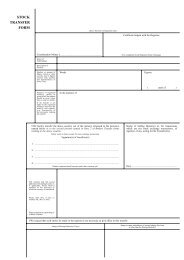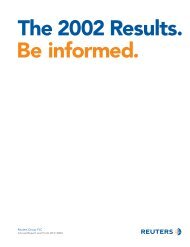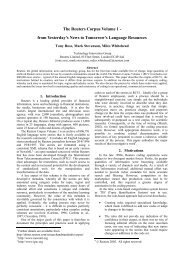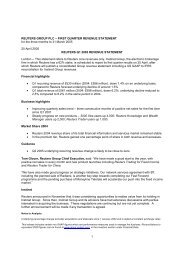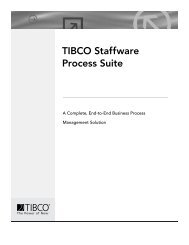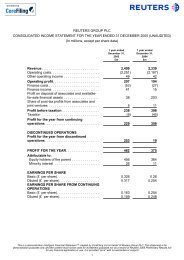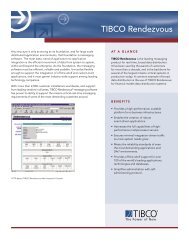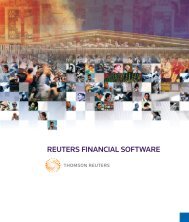REUTERS GROUP PLC ANNUAL REPORT AND ACCOUNTS 1999
REUTERS GROUP PLC ANNUAL REPORT AND ACCOUNTS 1999
REUTERS GROUP PLC ANNUAL REPORT AND ACCOUNTS 1999
Create successful ePaper yourself
Turn your PDF publications into a flip-book with our unique Google optimized e-Paper software.
11. Analysis of net fundsBANK/OTHERBORROWINGSFALLING FALLINGCASH AT TOTAL DUE DUE AFTERBANK <strong>AND</strong> CASH <strong>AND</strong> SHORT-TERM WITHIN MORE THANIN H<strong>AND</strong> OVERDRAFTS OVERDRAFTS INVESTMENTS ONE YEAR ONE YEAR TOTAL£M £M £M £M £M £M £M31 December 1997 81 (42) 39 1,275 (6) (18) 1,290Cash flow (38) 30 (8) (313) (986) 14 (1,293)Exchange movements 1 (1) – – – – –31 December 1998 44 (13) 31 962 (992) (4) (3)Cash flow 77 (102) (25) (476) 799 (257) 41Exchange movements (2) 1 (1) 4 – – 331 December <strong>1999</strong> 119 (114) 5 490 (193) (261) 4112. Derivatives and other financial instrumentsA substantial portion of Reuters revenue is receivable in foreign currencies and committed under one- and two-year contracts with terms of payment up to sixmonths in advance. As such, Reuters is subject to currency exposure from committed revenue. In addition, Reuters is subject to interest rate risk from borrowingsand the investment of cash balances. Reuters seeks to limit these risks by entering into a mix of derivative financial instruments which include forward contracts,options (including cylinders), swaps and forward rate agreements. A more detailed discussion on Reuters Treasury Management can be found in the operating andfinancial review (see pages 39–40).If the derivative financial instruments were considered separately from the underlying future revenue and interest income, Reuters would be subject to market riskon these financial instruments from fluctuations in currency and interest rates. Reuters only enters into such derivative financial instruments to hedge (or reduce) theunderlying exposure described above. There is, therefore, no net market risk on such derivative financial instruments and only a credit risk from the potential nonperformanceby counterparties. The amount of this credit risk is generally restricted to any hedging gain and not the principal amount hedged.Derivative instruments held at 31 December were:<strong>1999</strong> 1998 1997GROSS GROSS GROSSCONTRACT CARRYING FAIR CONTRACT CARRYING FAIR CONTRACT CARRYING FAIRAMOUNTS VALUE VALUE AMOUNTS VALUE VALUE AMOUNTS VALUE VALUE£M £M £M £M £M £M £M £M £MCurrency managementForeign exchangeforward contracts:Contracts in profit 159 – 8 97 – 5 324 – 39Contracts in loss 131 – (11) 257 – (10) 59 – –Foreign currency options:Contracts in profit 234 – 8 205 – 2 53 2 2Contracts in loss 234 – (1) 194 – (3) – – –758 – 4 753 – (6) 436 2 41Interest rate managementInterest rate swaps 254 – (17) 100 – (1) 140 1 3Interest rate collars 100 – – – – – – – –Forward rate agreements 235 – – – – – 50 – –589 – (17) 100 – (1) 190 1 3Carrying values are amounts recorded in the balance sheet and comprise deferred option premia, which are recognised over the period to which the option relates,and certain locked in profits on swap contracts which have been recognised for accounting purposes but where settlement in cash has not yet occurred. Fair valuesrepresent the mark to market value of contracts at the balance sheet date.The foreign exchange forward contracts are held 33% in continental European currencies (1998 – 52%, 1997 – 56%). The remaining contracts were principally inJapanese yen and US dollars.Foreign exchange forward contracts and options mature at dates up to 23 months from the balance sheet date. Interest forward rate agreements, swaps and optionscommence and mature at various dates through to November 2004.The fair value of foreign currency and interest rate management instruments is estimated on the basis of market quotes, discounted to current value using marketquotedinterest rates.Reuters Group <strong>PLC</strong> Annual Report <strong>1999</strong> 53



